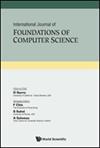Parameterized Complexity Classes Defined by Threshold Circuits and Their Connection with Sorting Networks
IF 0.6
4区 计算机科学
Q4 COMPUTER SCIENCE, THEORY & METHODS
International Journal of Foundations of Computer Science
Pub Date : 2023-04-27
DOI:10.1142/s0129054123410046
引用次数: 0
Abstract
The main complexity classes of the Parameterized Intractability Theory are based on weighted Boolean circuit satisfiability problems and organized into a hierarchy so-called W-hierarchy. The W-hierarchy enables fine-grained complexity analyses of parameterized problems that are unlikely to belong to the FPT class. In this paper, we introduce the Th-hierarchy, a natural generalization of the W-hierarchy defined by unweighted threshold circuit satisfiability problems. Investigating the relationship between Th-hierarchy and W-hierarchy, we discuss the complexity of transforming Threshold circuits into Boolean circuits, and observe that sorting networks are powerful tools to handle such transformations. First, we show that these hierarchies collapse at the last level (W[P][Formula: see text][Formula: see text][Formula: see text]Th[P]). After that, we present a time complexity analysis of an AKS sorting network construction, which supports some of our results. Finally, we prove that Th[[Formula: see text]] [Formula: see text] W[SAT] for every [Formula: see text]. As a by-product, our studies suggest that it is relevant to consider a new class based on logarithmic depth circuits in the W-hierarchy.阈值电路定义的参数化复杂度类及其与排序网络的联系
参数化难处理性理论的主要复杂度类别基于加权布尔电路可满足性问题,并组织成一个称为W层次的层次。W层次结构能够对不太可能属于FPT类的参数化问题进行细粒度复杂性分析。在本文中,我们引入了Th层次,这是由未加权阈值电路可满足性问题定义的W层次的自然推广。通过研究Th层次和W层次之间的关系,我们讨论了将阈值电路转换为布尔电路的复杂性,并观察到排序网络是处理这种转换的强大工具。首先,我们展示了这些层次结构在最后一个级别崩溃(W[P][Formula:见文本][Formula:见文本][Formula:见正文]Th[P])。然后,我们对AKS排序网络结构进行了时间复杂性分析,这支持了我们的一些结果。最后,我们证明了Th〔〔公式:见文本〕〕〔公式:看文本〕W〔SAT〕对于每一个〔公式:看到文本〕。作为副产品,我们的研究表明,考虑一个基于W层次中对数深度电路的新类别是相关的。
本文章由计算机程序翻译,如有差异,请以英文原文为准。
求助全文
约1分钟内获得全文
求助全文
来源期刊

International Journal of Foundations of Computer Science
工程技术-计算机:理论方法
CiteScore
1.60
自引率
12.50%
发文量
63
审稿时长
3 months
期刊介绍:
The International Journal of Foundations of Computer Science is a bimonthly journal that publishes articles which contribute new theoretical results in all areas of the foundations of computer science. The theoretical and mathematical aspects covered include:
- Algebraic theory of computing and formal systems
- Algorithm and system implementation issues
- Approximation, probabilistic, and randomized algorithms
- Automata and formal languages
- Automated deduction
- Combinatorics and graph theory
- Complexity theory
- Computational biology and bioinformatics
- Cryptography
- Database theory
- Data structures
- Design and analysis of algorithms
- DNA computing
- Foundations of computer security
- Foundations of high-performance computing
 求助内容:
求助内容: 应助结果提醒方式:
应助结果提醒方式:


